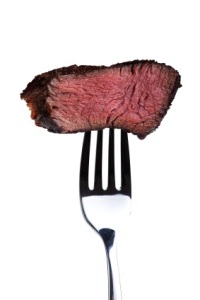Have you ever thought that your preference to eat meat or not may be genetic? Well a new study that’s linked a person’s genes to how appetizing meat smells, suggests that it is.
Researchers entered the study knowing that the way our bodies detect scents is through tiny chemical receptors that are perched on nerve cells inside the nose. It’s estimated that in total, humans have about 400 unique smell receptors that help sense around 10,000 different odors.
Some receptors detect androstenone – a steroid found in high concentration in male pigs. And previous research shows that 70% of the broader population has two copies of a specific gene that helps sense the steroid. Such people typically have a mixed reaction to pork, with many finding it disgusting and likening it to sweat or urine. But people with only one copy of the gene aren’t as bothered by the smell of androstenone.
Researchers of the study, which was published in the journal PLoS ONE, looked at whether a test could predict who carries the single copy of the gene, and whether the specific gene influenced the person’s perceptions of meat.
The study looked at 23 healthy participants, 13 of which were considered ‘average eaters’ and the other 10 were trained ‘sensory assessors,’ or individuals with a highly sensitive nose. To make this distinction, researchers added androstenone to two of three cups of water, and asked participants to smell each cup and then pick out which one was different. If they were correct, they were considered super smellers. If wrong, they were considered insensitive.
Researchers then had the participants eat cooked pork that contained varied levels of androstenone added to it, and were then asked to rate the smell and taste of the samples. Once the data was collected, researched tested participants’ genes and found that everyone who had a single copy of the gene could not smell the hormone, and were more likely to say the pork tasted pleasant. And those with two copies picked up the scent, and considered the meat to taste bad.
Of the study, Kara Hoover, PhD, – a biological anthropologist at the University of Alaska Fairbanks – told WebMD, “[For] people who are instinctively vegetarian or vegan or instinctively heavy meat-eaters, it could definitely have some sort of underlying biological component to it. When you consider that our food preferences are driven by flavor… clearly genetic variation in humans is going to make a difference in how we prefer food.”
One driving factor of the study is a case in Europe, where the government is considering no longer allowing farmers to control the amount of androstenone in pork by castrating male pigs. But farmers are hoping it doesn’t pass as they fear people will begin to turn up their noses at meat that contains higher levels of the hormone.
“It was surprising how this one gene could have such a clear influence on the preference of the food,” says Hiroaki Matsunami, PhD, associate professor of molecular genetics and microbiology at Duke University in Durham, N.C. “Taste is a complex mixture of taste, smell, texture and temperature. They combine to create a taste image in the brain. The olfactory component that plays the greatest role in whether you like the pork or not is determined by this gene.”
I likely have a single copy of the gene since I’ve always been drawn to the smell of meat, especially (BBQ) pork. But the findings are interesting, nonetheless, and are sure to spark discussions between meat eaters and haters alike.
Also Read:
Lower Your Risk of Diabetes by Skipping a Serving of Meat
